“The nation behaves well if it treats the natural resources as assets which it must turn over to the next generation increased; and not impaired in value.”
— President Teddy Roosevelt
RVATION FUNDING HERE]
Land and water conservation are taking a direct hit in President Trumps proposed budget.
In his message to Congress, President Trump called the cuts “sensible and rational.” But after reviewing the budget, we at Trout Unlimited strongly disagree with some of his EPA and natural resource agency cuts.
“The unwarranted cuts in the Budget proposal would take the EPA and other programs back to the last century,” said Steve Moyer, vice president of government affairs for Trout Unlimited. “For members of Trout Unlimited and people like me who have directly benefitted from the water quality and natural resources improvements of the past decades, this is completely unacceptable. We will work hard to convince the Trump Administration and Congress to remember the words of Teddy Roosevelt, reconsider many of these items, and do much better before the FY 2018 budget is finally decided in the Fall.”
Certainly, these numbers are not final and proposed cuts will have to go through Congress before taking effect.
Frankly, we’re going to need you. Here’s a short list of what’s at stake:
 alt=”” title=”” />Chesapeake Bay Program
alt=”” title=”” />Chesapeake Bay Program
The President’s budget proposes to eliminate funding for the EPA’s Chesapeake Bay Program. The elimination of this program would severely limit the amount of coldwater habitat conservation that TU and others can accomplish in the Chesapeake Bay headwaters, and would stall progress on Bay cleanup efforts. The Chesapeake Bay headwaters are home to some of the region’s best trout streams. The EPA’s Chesapeake Bay Program—in particular the Small Watershed Grants—has enabled TU to work with farmers in Virginia and West Virginia to improve both farming operations and trout habitat on their lands, and with local communities in Pennsylvania to restore trout streams, which in turn contributes cold, clean water to the Chesapeake Bay.
Great Lakes Restoration Initiative
The Great Lakes are home to a remarkable array of trout, salmon, and steelhead, and as a result, fishing is a major economic driver in the region. In recent years, fish habitat in many Great Lakes tributaries have been improving thanks to projects funded by the Great Lakes Restoration Initiative. TU and our partners have been using GLRI funds in places like the Pere Marquette, Little Manistee, Peshtigo, and Oconto rivers to remove barriers to fish passage and add habitat for coldwater fish. The elimination of the Great Lakes Restoration Initiative would stop this work in its tracks.
Land and Water Conservation Fund (LWCF)
The Budget proposal would dramatically reduce land and easement acquisition funds from the nation’s premier conservation law, the LWCF. Hundreds of millions of dollars would be cut from LWCF programs of the Forest Service, FWS, and BLM agencies. TU has long supported LWCF which has been used to enhance angler access and protect high quality trout and salmon habitat. For example, last year in Maine TU worked with landowners to protect the Cold Stream watershed, an actively timber harvested commercial forest that contains nine ponds that provide exemplary wild native brook trout habitat, critical habitat for the threatened Canada lynx, and important deer wintering areas. Good work like this would be eliminated if the Budget proposal was enacted.
 alt=”” title=”” />Public Lands
alt=”” title=”” />Public Lands
The proposed Budget Blueprint is purported to focus the Forest Service budget on maintaining existing forests and grasslands and supporting the capacity for land management operations for Department of the Interior.
“We support those objectives, but we will have to see specifics to determine if the President’s budget ensures our public land management agencies have the resources they need to effectively manage America’s public lands,” said Corey Fisher, senior policy director for TU’s Sportsmen’s Conservation Project. “Since 1998, we have seen a 39 percent decrease in staffing for managing National Forests. It is hard to imagine further cuts will resolve problems like a $314 million trail maintenance backlog that impact millions of hunters, anglers and other recreationists that depend on our Nation’s public lands.”
SeaGrant
SeaGrant’s funding would be zeroed out under the current proposal as part of a larger cut to the National Oceanic and Atmospheric Administration. SeaGrant is critical in providing important science and monitoring for fish populations on the coast. The work that they do is critical to our understanding of how salmonids use coastal streams, the bottlenecks they face, and how best to prioritize restoration actions. Trout Unlimited and our partners have used their data to develop better projects and evaluate project effectiveness. They go to great lengths to ensure their data is available for decision-making, and they excel at presenting complex issues to the public. In an era where good science is more important than ever, now is not the time to cancel out SeaGrant.
Public Lands Energy Development
 alt=”” title=”” />If the objective of the Administration’s Budget Blueprint is to focus spending where there is a justified need, then it misses the mark by needlessly prioritizing access for energy development over access for America’s sportsmen and women. The budget proposes to increase funding for energy development while making major cuts in bipartisan-supported programs that provide access for hunters and anglers such as the Land and Water Conservation Fund. In 2015, the most recent year for which statistics are available, the Bureau of Land Management approved 3,508 applications to drill, yet industry only drilled 1,621 new wells. The same year, there were 44,213 oil and gas leases in effect, but only 23,770 of those leases were producing oil and gas. When there is already more access to energy resources that industry has use for, America’s hunters and anglers have to ask why programs to provide access and land acquisitions for sportsmen are being cut? If we are to sustain our hunting and fishing traditions, we need more places to hunt and fish, not fewer.
alt=”” title=”” />If the objective of the Administration’s Budget Blueprint is to focus spending where there is a justified need, then it misses the mark by needlessly prioritizing access for energy development over access for America’s sportsmen and women. The budget proposes to increase funding for energy development while making major cuts in bipartisan-supported programs that provide access for hunters and anglers such as the Land and Water Conservation Fund. In 2015, the most recent year for which statistics are available, the Bureau of Land Management approved 3,508 applications to drill, yet industry only drilled 1,621 new wells. The same year, there were 44,213 oil and gas leases in effect, but only 23,770 of those leases were producing oil and gas. When there is already more access to energy resources that industry has use for, America’s hunters and anglers have to ask why programs to provide access and land acquisitions for sportsmen are being cut? If we are to sustain our hunting and fishing traditions, we need more places to hunt and fish, not fewer.



